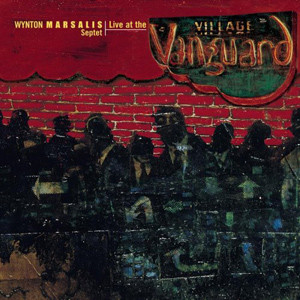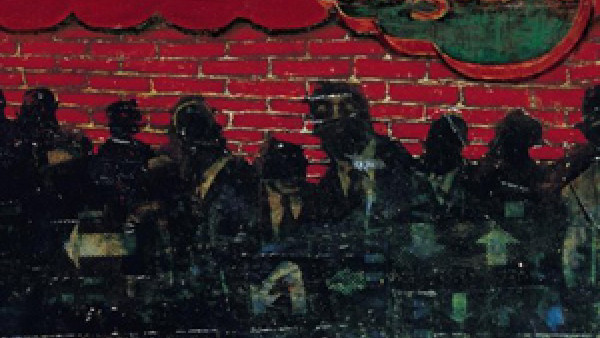It’s the End of the Riff for Wynton Marsalis’s Septet
Wynton Marsalis made news in his first set on Tuesday night at the Village Vanguard. Before he began to play, the trumpeter and band leader announced that this week’s engagement would be the last for his septet, one of the most influential and active bands in jazz.
Mr. Marsalis had been hinting recently that he was about to take a sabbatical, and now it was official. “I’m going to enjoy this last week,” he said from the stage, but there was a slight sense of sadness in the air, a feeling that something important had run its course.
After the announcement, the band broke into an extended blues, with Mr. Marsalis taking his time at first, then suddenly cramming in long lines. Later the septet played rearranged versions of Thelonious Monk’s “Four in One” and “Evidence” back to back, and ended with an excerpt from Mr. Marsalis’s suite “Blood on the Fields.” The music had a relaxed feel, the interplay among musicians seemed effortless.
Since Mr. Marsalis formed it seven years ago, the septet has functioned as a virtual workshop for some of the best young musicians playing. His pianists, for instance, have included Marcus Roberts, Stephen Scott, Cyrus Chestnut, Peter Martin and, currently, Eric Reed. More important, the band has been an invaluable example for younger musicians. In its control of harmony and texture, its easily identifiable group sound and its ability to reach audiences, the band has taught young musicians that there is a future in serious music, and that serious music has serious challenges beyond improvisation.
“When I first started really applying myself to jazz, in the late 1970’s, all my role models were my parents’ age,” said one of Mr. Marsalis’s saxophonists, Wess Anderson. “Jazz was something that I thought I’d do on weekends, for fun. Then Wynton came along and it became clear that this was something that could be done, and that I had peers. I think the band has been that way for a lot of young musicians, made them see that people their own age could play the music.”
The septet now includes, besides Mr. Marsalis, Mr. Anderson and Mr. Reed, Victor Goines on saxophone, Wycliffe Gordon on trombone, Ben Wolfe on bass and Herlin Riley on drums. Largely because of the stature and influence of Mr. Marsalis, it has had more resources, musical and financial, than any other small group currently playing. Its range is from New Orleans marches to reharmonized Thelonius Monk to the modernism of John Coltrane’s classic quartet to deep blues.
The band has also played rare pieces by Duke Ellington, brooding, dark ballads, and generally used the history of the music as an archive.
“This band reached literally millions of people,” said Mr. Marsalis after the set. “And we brought real, swinging jazz to a whole new generation of musicians. I’m happy with what we’ve achieved.”
But now Mr. Marsalis is on to something else, and breaking up the band has become a necessity. He has been on the road for the last 15 years; the band plays three weeks out of the month, leaving only one week for Mr. Marsalis to attend to his other business, including helping run Lincoln Center’s jazz program, teaching and scores of other obligations.
The recent success of “Blood on the Fields,” the orchestral suite he wrote for Lincoln Center, along with his more complicated long-form compositions, suggested that the big band was the direction he needed to go in. For the most part, a big band is economically unfeasible; Mr. Marsalis has access to one at Lincoln Center. As for the sabbatical, Mr. Marsalis once took a long vacation to Hawaii and left after one day, bored.
“Vacations, I’m not capable of them,” he said.
How about the sabbatical?
“That’s just not possible,” he said. “I’m going to concentrate all my energy on Lincoln Center now. I want to work with a big band, write more on that scale.”
Mr. Marsalis is also intent on using some of his free time to study. He plans to work through a reading list with the cultural historian Albert Murray, and wants to do some serious, sustained listening to music. And he wants to collaborate with musicians he has met on his travels throughout the world.
“I want to work with a Japanese trumpet player, Tomona Hara,” he said. “I know musicians in Brazil I want to work with. I have a few short tours set up for next year, and I’ll be doing them with a quartet of young musicians.”
For the rest of the members of the septet, it is the disbanding of a sort of family; they spent more time with one another than they did with their own families. For Mr. Reed and Mr. Anderson, it is also an exciting time, as they have both recently started their own careers as band leaders. Mr. Anderson recently released one of the better albums of the year, “Warmdaddy in the Garden of Swing” (Atlantic), and Mr. Reed’s third album is due out in a few months. Both of them are setting up tours.
“It’s really great to be out on your own,” said Mr. Anderson, “because you can test all the things you’ve been playing and experiencing on the road for years. It’s your chance, and leading a band means that you’re naked. It takes courage and conviction. What I’ve learned with Wynton, playing that hard music, with all its history, night after night, gave me an education that can’t be duplicated. Now it’s my job to translate it, and keep preaching the gospel.”
by Peter Watrous
Source: The New York Times


